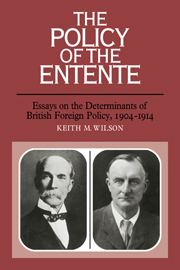Book contents
- Frontmatter
- Contents
- Acknowledgements
- Introduction
- 1 The Poverty of the Entente Policy
- 2 The Politics of Liberal Foreign Policy I
- 3 The Politics of Liberal Foreign Policy II
- 4 The Dissimulation of the Balance of Power
- 5 The Fiction of the Free Hand
- 6 The Invention of Germany
- 7 The Military Entente with France
- 8 The Cabinet's Decision for War, 1914
- Notes
- Bibliography
- Index
8 - The Cabinet's Decision for War, 1914
Published online by Cambridge University Press: 04 August 2010
- Frontmatter
- Contents
- Acknowledgements
- Introduction
- 1 The Poverty of the Entente Policy
- 2 The Politics of Liberal Foreign Policy I
- 3 The Politics of Liberal Foreign Policy II
- 4 The Dissimulation of the Balance of Power
- 5 The Fiction of the Free Hand
- 6 The Invention of Germany
- 7 The Military Entente with France
- 8 The Cabinet's Decision for War, 1914
- Notes
- Bibliography
- Index
Summary
On Sunday 2 August 1914, Asquith received a note from Bonar Law and Lord Lansdowne in which the Conservative leaders offered their ‘unhesitating support’ to the Government in any measures it might consider necessary for the object of supporting France and Russia. Of this communication Grey wrote in his memoirs: ‘The message was first read and then laid aside; it could have no influence on our discussion.’ In an article published in 1973 Donald Lammers concluded that ‘the state of our information does not justify ascribing a high or determining importance to Conservative statements and actions in connection with the British decision to go to war’. In doing so he added his name to those of Robert Blake, Roy Jenkins, Keith Robbins, Samuel Williamson and Cameron Hazlehurst, who have in his words maintained that ‘the Conservative letter counted for almost nothing and the relentless march of events almost everything in the way of changing or settling ministerial minds’ in the European crisis of late July and early August 1914.
It is my object here to do the following things: to establish when, and on what grounds, the British decision to take part in the European war was taken; to suggest that the part played by the Tories can be measured only when taken in conjunction with other political factors; to argue that the role of party political considerations was greater than has customarily been maintained; to contend that the argument that the German invasion of Belgium was crucial is one that has been far too readily employed, and that the ‘march of events’ (which is, in effect, what the argument amounts to) was not by any means as ‘dominating’ as Churchill at one point forecast that it would be.
- Type
- Chapter
- Information
- The Policy of the EntenteEssays on the Determinants of British Foreign Policy, 1904–1914, pp. 135 - 147Publisher: Cambridge University PressPrint publication year: 1985



